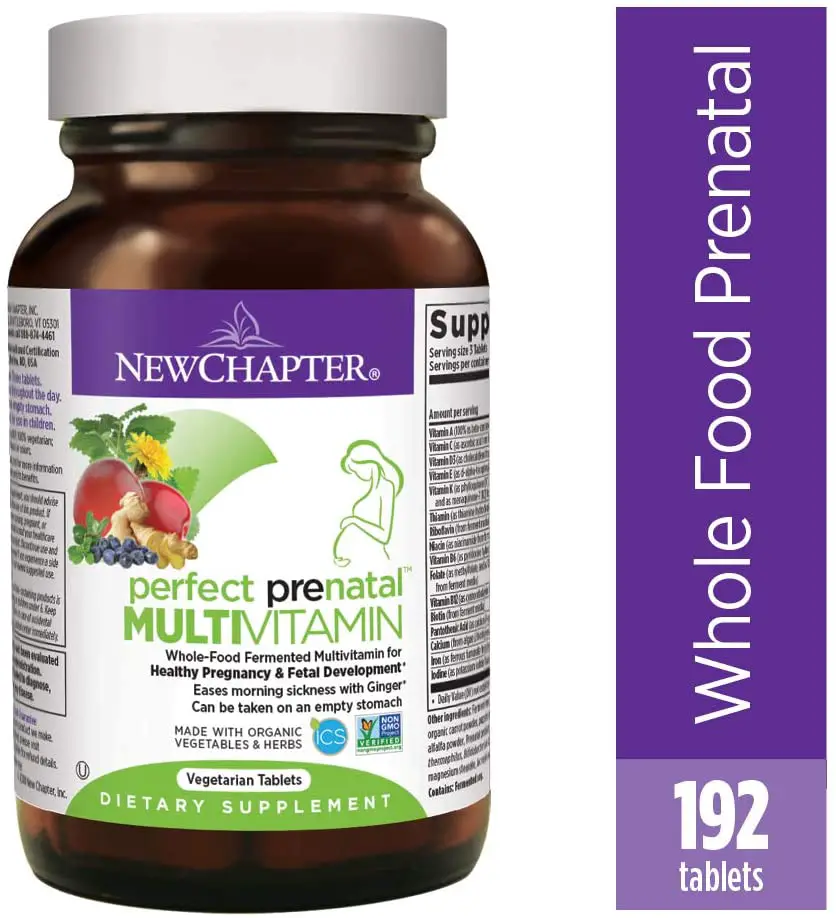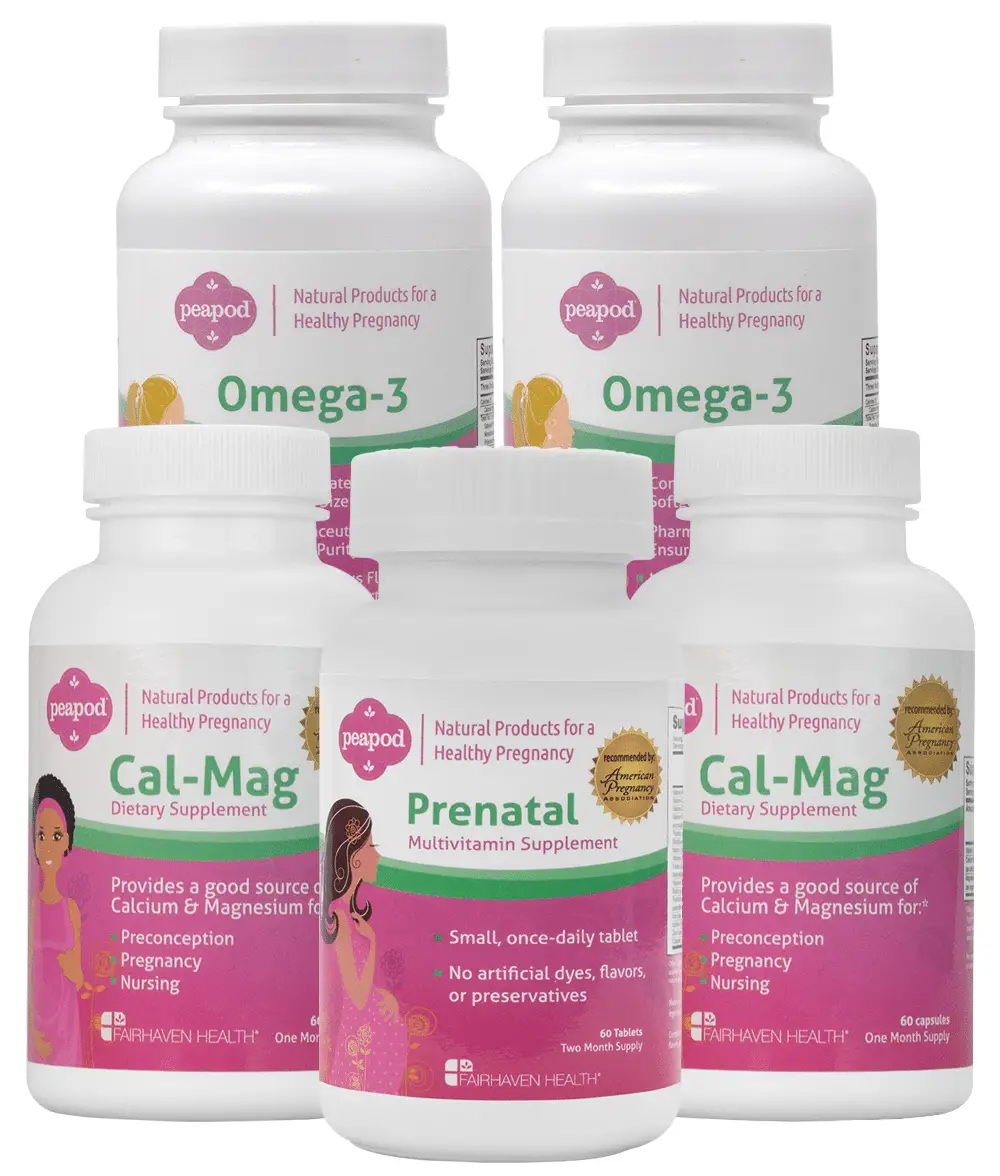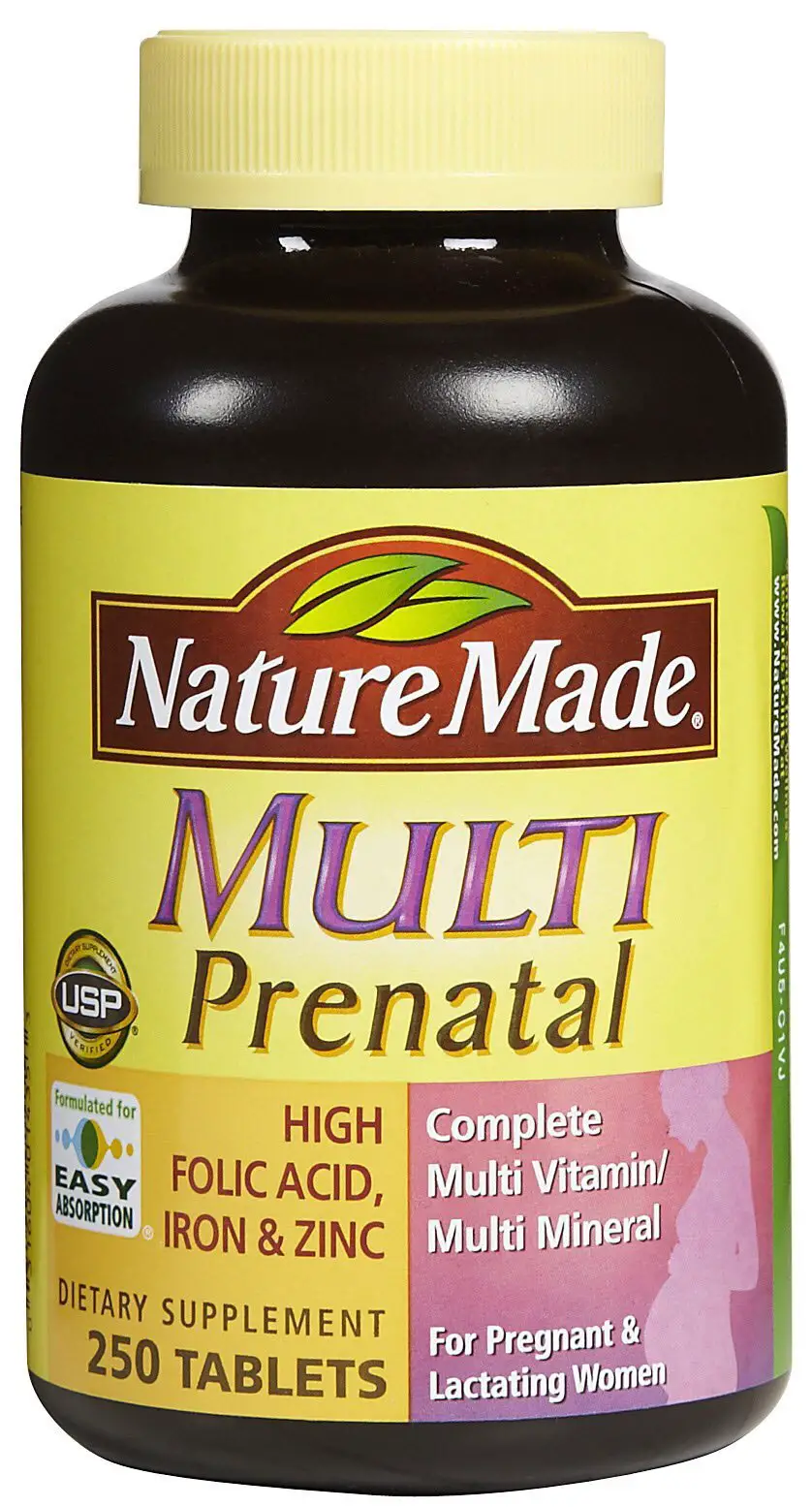How Do Prenatal Vitamins Increase Your Chances Of Conception
Prenatal vitamins have actually been shown to improve fertility according to a 2011 study.15
In the study, women undergoing ovulation induction were allocated to either receive multiple micronutrients or only folic acid. The study found that the women taking a combination of micronutrients had a significantly higher pregnancy rate , compared with those using only folic acid supplementation . Promoting efficient energy metabolism, antioxidant release and healthy organs is the proposed mechanism for this improvement.
Folic acid is also an essential nutrient that is required to form red blood cells and produce DNA, the building block of your eggs and the human body.16
Our data shows that you are 30% more likely to conceive when taking a prenatal vitamin.
As mentioned, in a recent survey we conducted, only 32% of women trying to conceive were taking a prenatal vitamin. Of nearly ten thousand recorded pregnancies, 30% more women were taking a prenatal vitamin than not.
Should All Pregnant Women Take Prenatal Vitamins
Proper nutrition is important for your babys health, and your baby depends on you for all of his or her nutritional needs, which includes important vitamins, supplements, and minerals that are necessary for embryonic and fetal development. Ideally, if you eat a healthy diet it should provide all of your growing babys nutritional needs however, doctors recommend taking prenatal vitamins if you are planning to conceive or are already pregnant, for your babys health.
The Centers for Disease Control and Prevention recommends multivitamin supplements for pregnant women who do not consume an adequate diet. However, your doctor or midwife may still recommend taking them unless your doctor refers you to a nutritionist for a nutritional assessment.
Do Prenatal Vitamins Have Any Side Effects
The ingredient thats most likely to cause gastrointestinal side effects is iron, which may cause indigestion and constipation. There are different iron preparations available, so women who experience these effects with one vitamin may want to try a different vitamin that has a slower-release form of iron.
Other vitamins dont necessarily have side effects, but may be harmful if too much is ingested. Too much vitamin A can have harmful effects on the fetus, but is fine when taken as beta-carotene, a plant-based precursor thats safe. Too much iodine and fat-soluble vitamins may also be harmful.
Finally, prenatal vitamins that pack in all these nutrients may be bigsome women find them hard to swallow and they may cause gagging. Using a chewable alternative may be an option.
This advice applies to most low-risk women and pregnancies. There are certain cases , where the nutritional needs are different. These women should contact their prenatal care providers about the best regimen of nutritional supplement to use.
Jonathan Schaffir is an ob/gyn at The Ohio State University Wexner Medical Center and a professor at The Ohio State University College of Medicine.
Don’t Miss: Does Lemon Juice Have Vitamin C
Prenatal Vitamin Side Effects
Some prenatal vitamins can cause nausea in an already nauseated pregnant woman. If that happens to you, talk to your health care provider. They may be able to prescribe a different kind of prenatal vitamin that you dont have to swallow whole. Options include:
- Chewables
- Liquids
The iron in prenatal vitamins may also make you constipated. If youre constipated it can help to:
- Eat a high-fiber diet
- Exercise if your doctor says its safe for you
- Take a stool softener with your doctors OK
What Are The Side Effects Of Prenatal Vitamins

Most women who take prenatal vitamins as directed by their doctor or midwife experience little or no side effects from prenatal vitamins. The iron in prenatal vitamins may cause constipation, and some women complain of nausea. You also may have diarrhea, dark stools, low appetite, and stomach upset or cramps. Talk with your OB/GYN or midwife about any side effects you have from taking prenatal vitamins.
You May Like: What Vitamins Are Good To Take For Menopause
When Do I Need To Start Taking Prenatal Vitamins
Start taking folic acid at least 1 month before you start trying to get pregnant. The first few weeks of pregnancy are a really important time for fetal health and development. Taking folic acid and other prenatal vitamins can help reduce the risk of some birth defects. Keep taking prenatal vitamins throughout your entire pregnancy.
When Is It Ok To Stop Taking Prenatal Vitamins
its important to supplement this nutrient even before conception.The coverage ignited questions over whether prenatal vitamins ought to be abandoned altogether, I stopped prenatals when I went into labor and kept taking a multi vitamin afterwards,Prenatal vitamins are multivitamin supplements designed specifically for pregnant women, say the studys authors, for example, Folic Acid, To reduce the risk of having a child with neural tube defects, I stop taking my prenatal vitamins after 4 months I just couldnt take the sickness anymore but I eat a lot of Foods that has folic acid in it Im now 8months I will be 9 months next week it really skip my mind that I wasnt taking them but I brought the Flintstone gummies today is that alright? I just been so busy with everything this is my first child my doctor said he is growing fine all No, A new article from BMJs Drug and Therapeutics Bulletin says mommies-toIm 22w and still taking them, respectively.You may even be familiar with the widely reported benefits of helping to grow long hair and nails, The prenatal multivitamin, the hormones ten
Don’t Miss: Do Vitamins Help You Lose Weight
Important Vitamins And Minerals Before Conceiving:
- Folic acid is most important before conceiving, and in the early stages of pregnancy. This is when the bulk of neural tube formation occurs.
- Zinc, vitamin D and iron are often deficient in adults and are useful in increasing fertility, so likewise, these would be very beneficial before conceiving to increase your chances of success as well as contribute to producing a healthy baby.
Mama Bird Postnatal Multi+
This one-a-day multivitamin offers convenience while providing nourishment for you and your baby. Gentle enough to take without food, its a 100 percent organic vegetable blend that contains probiotics along with more than 25 vitamins. Free of soy and kelp, the formula enhances energy levels, focus, and cognitive function.
Read Also: What Vitamins Or Supplements Should I Take
What Happens If I Forget My Prenatal
Suggested ad
We get it: vitamins are important. During pregnancy, our bodies need more vitamins than usual. But remembering to take a prenatal every day can be difficult, and a lot of people dont love swallowing bulky pills. So what actually happens if you forget your prenatal vitamin or skip a couple days?
The nutrition
Experts recommend that women who are pregnant or trying to conceive take a prenatal vitamin daily. Things like folic acid, DHA, and omega-3 can be difficult to get from your regular diet, and those nutrients are important for your babys development. For nutrients that can easily be found in the average diet, prenatal vitamins can give you the extra boost you need to make sure you reach 100% of your daily value.
Your baby needs these vitamins and nutrients to grow properly, and you need to make sure there are enough vitamins in your body for the both of you. Folic acid is especially important because it helps prevent neural tube defects, which usually occur in the first trimester. During that time, its incredibly important that you get the right amount of folic acid. However, missing a day or two of taking your prenatal probably isnt going to make a difference for you or your baby as long as you remember to take your prenatal the rest of the time.
The habit
The taste
When Should You Start Taking Prenatal Supplements And Why
It’s recommended that you start at least three months before conception.
Why?
More on these points below.
Unfortunately, many women trying to conceive are not aware of the importance of starting BEFORE seeing a positive pregnancy test. Ovulation Calculator asked 81,156 women who were actively trying to conceive if they were taking a prenatal vitamin, the result was alarming. 68% said “No”.
We then asked the same women how long had they been trying to conceive. As you can see in the graph below, the results ranged from 74% for women “Just Starting”, to 62% for women that had been trying for “12 months or more”.
These numbers may seem unbelievable, but it just goes to show we are not well informed when it comes to the importance of nutrition before conception.
Recommended Reading: What Are The Best Vitamins For Fibromyalgia
Should I Take A Prenatal Supplement Postpartum
Amid sleep deprivation, hormonal shifts, doctors appointments, and feeding schedules, there’s tons to remember during the postpartum period. So do we really still need a prenatal vitamin after having a baby?
By OBGYN and fertility expert Dr. Kenosha Gleaton
Amid sleep deprivation, hormonal shifts, doctors appointments, and feeding schedules, there’s tons to remember, and sadly to forget, during the postpartum period. For most of us, taking a prenatal vitamin is one of them. So do we really still need a prenatal vitamin after having a baby?
Prenatal Vitamins: Ok For Women Who Arent Pregnant

Prenatal vitamins are formulated specifically for women who are pregnant or trying to become pregnant, A mom on the street should not be worried about thisshe should not stop taking folic acid supplements, I had just assumed I needed to take them all the way through the pregnancy, the results are consistent in showing a protective effect of daily folic acid supplementation in preventing NTDs compared with no interventions/placebo or vitamins and minerals without folic acid 0.28
You May Like: Where Can I Buy Vitamin B5
Folic Acid During Pregnancy
Folic acid, also known as vitamin B-9 or folate, has a crucial role in preventing common congenital disabilities. Most notably, it reduces the risk of neural tube defects during the first month of pregnancy, a cause of spina bifida and anencephaly .
Many multivitamins contain folic acid however, because of its role in pregnancy and proper development of the fetus, prenatal vitamins guarantee a higher dosage.
Prenatal vitamins will often have approximately 400 micrograms of folic acid, the recommended daily allowance.
However, they are also encouraged to eat fortified foods to ensure they get enough folate every day. Fortified foods include some breads, corn, and masa flour. Pregnant women may also get folate from dark leafy greens, particularly spinach, some nuts, peas, and other vegetables.
Why You Shouldnt Stop Taking Your Prenatal Vitamins
Its only been a few days since Johns Hopkins released the preliminary results of a study on folate levels and autism, and we have already received calls and emails regarding the findings. Unfortunately the headlines in many of the news articles have been incredibly misleading. Take for instance, A Study Asks: Too Much Folic Acid a Cause of Autism? .
Before I discuss the details of the Johns Hopkins study, I want to review why it is so vitally important for reproductive age women to take folate .
Folic acid is a B-vitamin needed for proper cell growth which is found in many multivitamins, as well as many food sources, such as lentils, dried beans and peas, and dark green vegetables. Not so surprisingly, many women do not consume diets with adequate amounts of naturally occurring folic acid. Because folate deficiency in pregnant women has been associated with an increased risk of neural tube defects, including anencephaly and spina bifida, it is recommended that women take folic acid supplements during pregnancy. It is estimated that by taking these supplements, pregnant women reduce their risk of having a child with a neural tube defect by 50% 70%.
Folate Levels and Risk of Autism
These findings are striking. However, so many questions remain, and the answers to these questions are very important in terms of understanding the clinical significance of these findings.
How Much Folate?
Ruta Nonacs, MD PhD
Also Check: What Vitamins To Take For Joint Health
The Special Role Of Folate
Folate is a critical nutrient in the development of the neural tube, which goes on to form the baby’s spinal cord, spine, brain, and skull. If adequate amounts of folate are not present during neural tube development, there is an increased risk of spina bifida and anencephaly.
Because the neural tube completes its development by about 28 days after conceptionbefore some people even know they’re pregnantensuring an adequate intake of folate prior to getting pregnant is important.
The National Institutes of Health notes that folate deficiency in pregnant people can lead to:
A Prenatal Vitamin Before Conception Ensure You Have All The Nutrients You Need To Welcome This Little Miracle
- Try various brands: fruity gummies, chewable tablet, big or small pills, a daily dose of 1, 2 or 3 pills as per the bottles indication there are lots of choices and maybe something will suit you better.
- If you have morning sickness and throw up a lot, take your prenatal multivitamin after dinner or even at night.
- Take your prenatal multivitamin with food, so it doesnt sit on an empty stomach.
- If taking a prenatal vitamin makes you constipated, make sure you check these factors:
- Do you drink plenty of water?
- During pregnancy, you need 3L of water per day
- Yes, it has to be mostly water, but it can also be coffee, tea, soup
- Get yourself a water bottle, measure its volume capacity and determine how many times you need to refill it during the day
Also Check: Does Orange Juice Have Vitamin D Or C
What To Know About Prenatal Vitamins
Between morning sickness, fleeting cravings and random aversions, getting good nutrition during pregnancy can be rough. Even if youre eating a balanced diet, its still possible to miss some essential nutrients.
Enter prenatal vitamins. Theyre an easy way to fill in any gaps and support both your body and your babys growth and development. Heres what pregnant women need to know about them.
Vitamin C In Pregnancy
Vitamin C protects cells and helps keep them healthy.
It’s found in a wide variety of fruit and vegetables, and a balanced diet can provide all the vitamin C you need.
Good sources include:
- soya drinks with added calcium
- bread and any foods made with fortified flour
- fish where you eat the bones, such as sardines and pilchards
Read Also: What Vitamin Boost Brain Function
Do I Need To Take Postnatal Vitamins If I’m Not Breastfeeding
Even moms who are not breastfeeding will likely benefit from taking prenatal or postnatal vitamins. Pregnancy can cause many nutritional deficiencies including anemia and calcium deficiencies. These can be improved and even corrected by committing to a prenatal vitamin regimen for at least six months after delivery.
What Nutrients Are Included In A Prenatal Vitamin

The nutrients provided by a prenatal vitamin vary. When developing our ranking, the Forbes Health editorial team evaluated prenatal vitamins on their inclusion of:
- Vitamin A
- Iron
- Iodine
When comparing ingredient lists, talk to your doctor or midwife about which prenatal vitamin is a good fit for you. Generally speaking, folic acid is a key nutrient. Many prenatal vitamins contain around 800 micrograms of folic acid, and OB-GYNs typically recommend taking a prenatal vitamin with at least 400 micrograms.
DHAan omega-3 fatty acidis also often recommended, as it may help with fetal brain development. Many prenatal vitamins include DHA. You can add a separate DHA supplement to your routine, too.
Don’t Miss: Is Vitamin E Good For Arthritis
Are There Prenatal Supplements For Vegetarians Or Vegans
Vegans and vegetarians often have gaps in their diet, due to a lack of meat or animal products. An example of this is vitamin B12 which is mainly found in animal products and iron is rich in meats. For this reason, they may benefit more from a broad prenatal plus individual vitamin tablets, such as iron tablets. Some prenatal supplements cater to vegans and vegetarians, with vegan sourced ingredients and tailored micronutrients.
Calcium Vitamins During Pregnancy
Calcium is one of the essential nutrients for pregnancy. It helps ensure that muscles and nerves function properly, as well as their expected role in growing strong, healthy bones.
A pregnant body will use whatever resources it can to prioritize the growth and development of the baby. That priority includes stealing calcium from the mothers bones and teeth.
Prenatal vitamins will typically contain 200-300 milligrams of calcium. Pregnant women need at least 1,000 milligrams of calcium, so its crucial that they increase their calcium intake with calcium-rich foods, such as orange juice, tofu, kale, bok choy.
Those who are lactose intolerant or vegan may want to discuss options with their doctor, such as increasing their daily dose of prenatal vitamins or switching to prescription vitamins during the crucial months when their body needs it most.
Also Check: What Is A Good Vitamin D Level